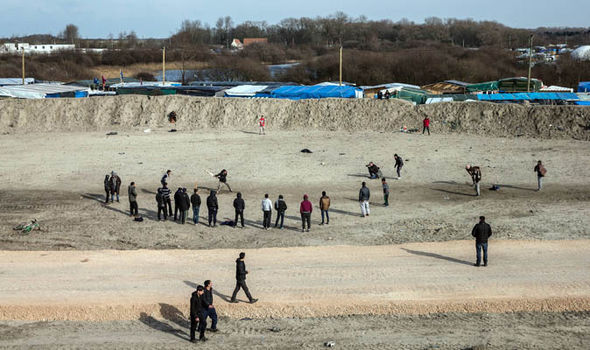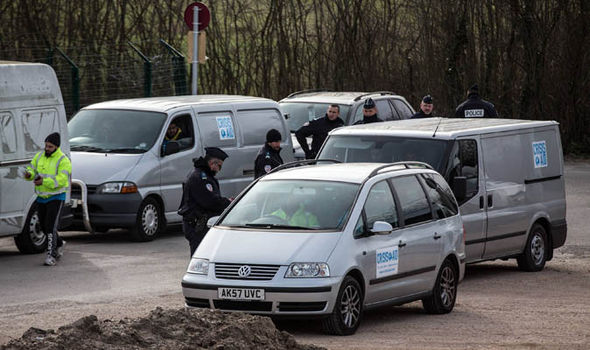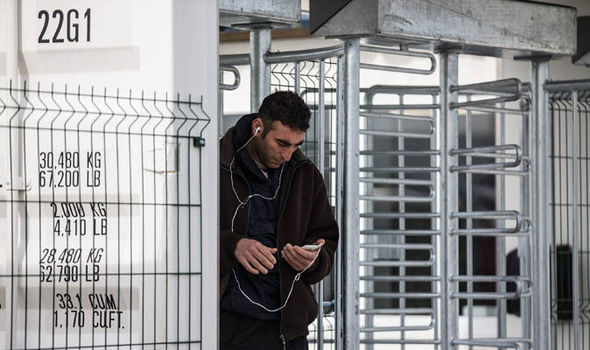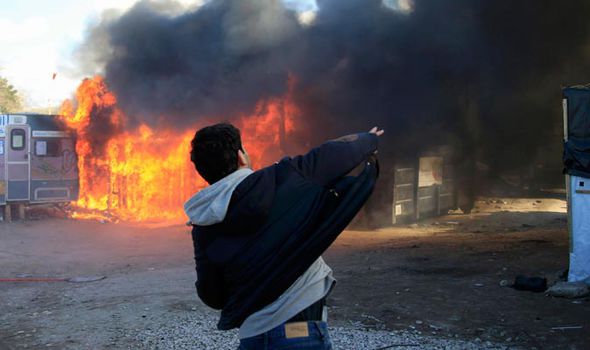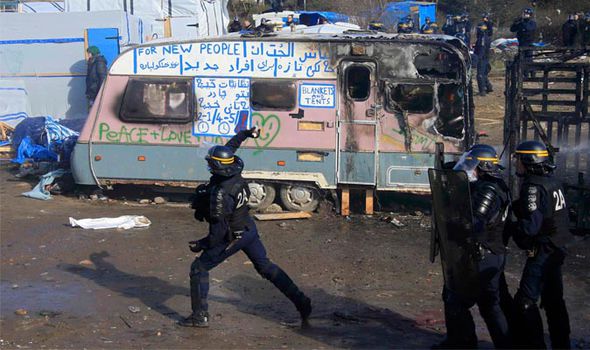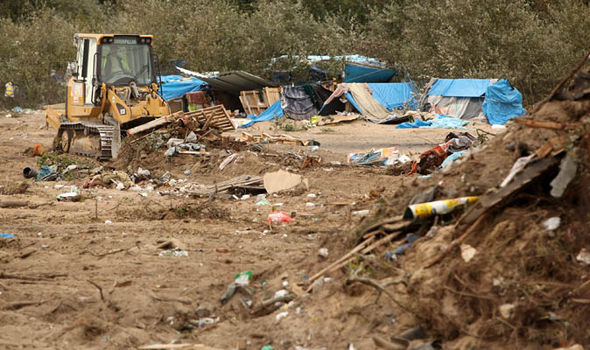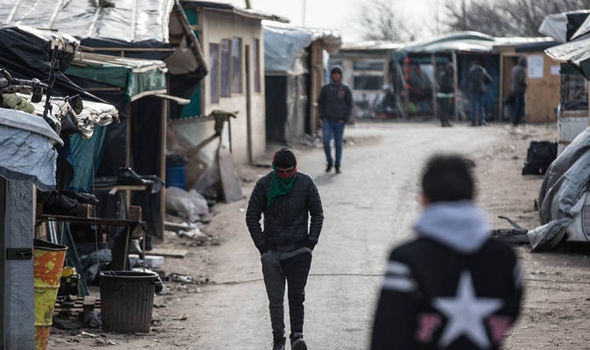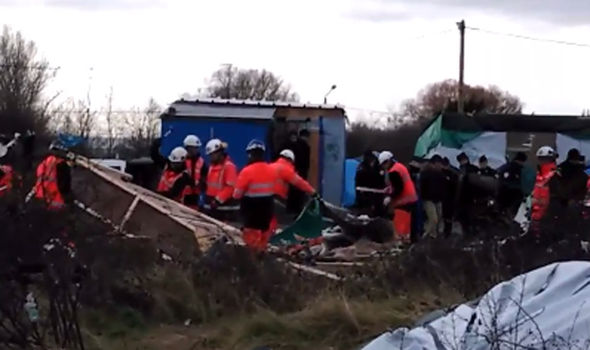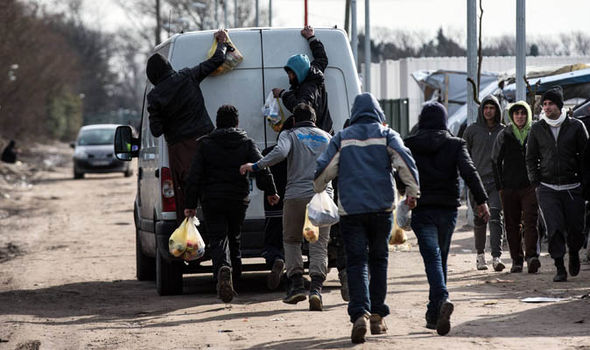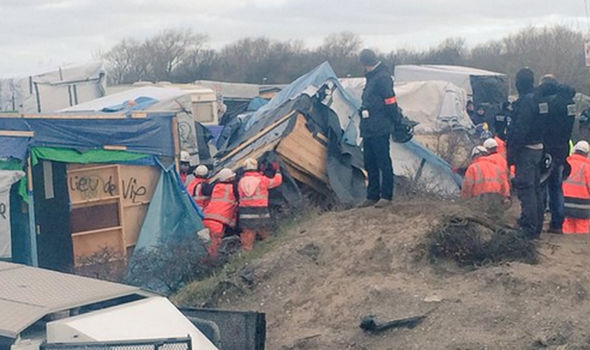CALAIS BURNS: Migrants in violent clashes with police over Jungle camp demolition
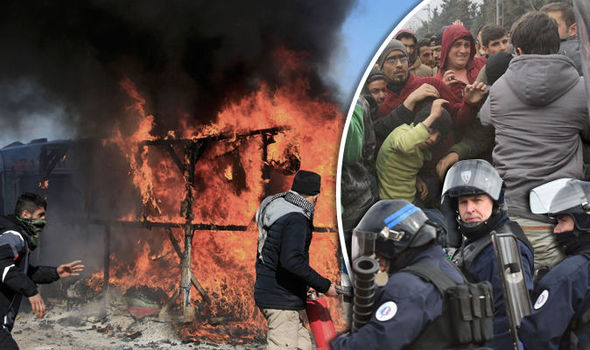
FIRES have been started across the Calais Jungle camp as French authorities continued dismantling shelters and tents with hammers today.
As smoke filled the air, migrants turned on police who used tear gas to try to disperse the rioters.
Demolition crews entered the crime-ridden camp on Sunday morning after a judge gave his final blessing to plans to pull down a huge section of the tent shanty town.
Hundreds of migrants are being evicted from the southern section of the camp in a move which could reduce its population to less than a thousand.
But as French removal staff tried to dismantle temporary structures in the camp, some were set on fire while stones were thrown at them and then police who stepped in to help.
Police responded by throwing tear gas bombs into the camp, with the wind blowing the gas across the entire southern section.
A massive police presence has been deployed to the makeshift shanty town, with more than 100 officers guarding bulldozers demolishing the southern part of the camp.
Earlier officers had threatened to use force against those who refuse to evacuate the area, according to reports from social media.
The Calais prefect, Fabienne Buccio, said the threat was justified due to "verbal and physical assaults" made against authorities at the end of last week.
Those who tried to encourage migrants to move into accommodation provided by the government were "insulted [and] harassed" by "mainly British activists", according to Ms Buccio.
The politician added that activists had tried to stop migrants boarding buses to go to migration centres.
At least 55 police vans arrived at the scene yesterday and the area was cordoned off by officers.
Authorities are threatening to arrest migrants who refuse to leave the Jungle as people sit on the roofs of shelters in protest.
So far at least one arrest has been made since the dismantling of the camp started at 8.30am local time on Saturday. According to reports a female member of the anarchist group No Borders has been arrested by French police after allegedly encouraging migrants to attack officers dismantling the camp.
Reacting to the violence UKIP's defence spokesan Mike Hookem said: "It's appalling to think that this is only a few miles away from the British coast because it's the kind of thing you expect to see on news reports from the Gaza strip or the West Bank.
"Calais has every right to want these camps gone: these people are only here to try to illegally get into the UK. The trouble is, EU law won't let the French move them on so the problem will just keep moving to different ports and won't stop until we take control of our borders and close Schengen."
The move will come as a huge relief for locals in the besieged port town, who have been subjected to years of violence and intimidation by the notorious crime gangs who run the Jungle.
It is also hoped it will alleviate the unbearable pressure on British truckers, who are routinely attacked by migrants front he camp whilst travelling through Calais on their way to Dover.
Reacting to the eviction Calais mayor, Natacha Bouchart, said: "I am satisfied by this responsible decision which will allow the progressive dismantling of the southern part of the Jungle to proceed over the next three weeks."
Moving in to close the camp is the most dramatic step yet by the French state to end Calais' years-long migrant problem, which has transformed the port city into a high-security tension point.
It comes after the new president of the Calais region, Xavier Bertrand, made razing the camp to the ground a key policy.
Migrants and humanitarian groups had tried to stave off the eviction by launching a legal complaint, sending a letter to the interior minister and issuing public pleas.
Emotions were running high this week as the deadline loomed for the destruction of half the 'Jungle' migrant camp in Calais, with migrants refusing or unable to move.
John, a 28-year-old Sudanese migrant, said: "I don't have anywhere else to go.
"We don't want to leave Calais because we don't want to get further away from England, which is still our goal."
A French judge and other officials visited the camp earlier last week to see conditions for themselves before making a ruling on whether the eviction should go ahead.
Up to 1,000 migrants are believed to be affected by the eviction, although aid workers claim the figure could be much higher.
The Help Refugees charity said it carried out its own analysis showing there were 3,455 people — including up to 300 children — living in the affected part of the Jungle who faced being "evicted from their homes in the midst of winter, without sufficient alternative accommodation on offer".
A spokeswoman said: "Our concerns remain with welfare of the unaccompanied minors.
"We have had no assurances from the French authorities that they will conduct assessments to determine best interests of these children and ensure proper safeguarding is in place before removing them from the camp and the communities they know and trust."
French Interior Minister Bernard Cazeneuve said the eviction would be done "progressively, by persuasion and with respect for people's dignity".
The move has also been welcomed by UK haulage groups, who have been campaigning to improve safety for lorry drivers who are regularly subject to violent attacks.
The evicted migrants have been offered heated accommodation in refitted containers set up next door to the Jungle.
But many are reluctant to move there because they lack any communal spaces and movement is restricted.
They have also been offered places in around 100 accommodation centres spread around France.
All of the migrants will be moved to purpose built accommodation where they will have access to heating, running water and proper healthcare, but many say there is not enough room for all of them.
Officials are encouraging them all to claim asylum in France rather than risk the perilous crossing to Britain.
Those who have a legitimate claim to the move to the UK, such as having close family here, will then be officially brought across to resettle.
Despite that many migrants have actively resisted the move, moaning that the newly built facilities have better security and will prevent them from launching nightly bids to break into lorries or breach the Channel Tunnel.
Many Sudanese in the camp believe they have a better chance of claiming asylum in the UK rather than France because it can take only five months as opposed to two years in France.
French authorities have been forced to threaten physical eviction if thousands of migrants do not leave their tents at the camp, which is not officially sanctioned.
The movement comes after a court in Lille gave the French government permission to evict migrants from their tents in a densely populated area of the camp, although judges stopped short of allowing them to raze the whole shanty town.
The court ruled that communal spaces, like schools and places of worship, must be kept in place in a blow to those campaigners who want to see the entire camp destroyed for security reasons.
There are believed to be Islamic State (ISIS) jihadis hiding amongst the migrants in the Jungle, and authorities believe they can better manage the threat if people are in officially sanctioned accommodation.
Политика конфиденциальности | Правила пользования сайтом
